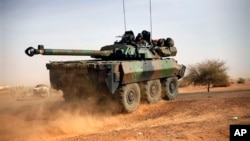UNITED NATIONS —
The U.N. Security Council has begun discussing the possibility of deploying a U.N. peacekeeping force in Mali, once Malian and French forces have stabilized the country.
In December, the Security Council authorized the African-led International Support Mission to Mali [AFISMA], to consist of about 3,000 troops from the region. The force was to be dispatched in September or October for a period of one year to help take back northern Mali from Islamist militant groups.
But with the Islamist offensive in January and the French military intervention that drove the militants out of their strongholds, diplomats say the situation has changed. They will now seek to transition the nascent AFISMA force, which accelerated its deployment and began arriving in Mali last month, into a mission that is under full U.N. control.
France’s U.N. ambassador, Gérard Araud, told reporters after Wednesday’s private meeting that before the mission can become a peacekeeping force, the situation on the ground must stabilize.
“We are not yet deploying a peacekeeping operation. There is the prospect of a peacekeeping operation," said Araud. "It was the first time that I was raising the issue in the Security Council and I was insisting on the fact that the deployment will be possible only when the security circumstances permit. So I think we have to wait several weeks before assessing the security environment and taking the decision of deploying a peacekeeping operation.”
Diplomats said privately that a resolution authorizing a peacekeeping force for Mali is not likely before the end of February. After that it could take about a further two months to “re-hat” the African forces into blue-helmeted U.N. peacekeepers.
U.N. peacekeeping chief Hervé Ladsous said his office already is working on all the different possible scenarios for Mali.
“This is all being worked upon. But I think the consensus [is] that it will have to be a peacekeeping operation when conditions allow, and that could happen, I think fairly quickly; then that is the way to go,” Ladsous.
In addition to a Security Council resolution laying out the size, scope and authority of such a force, the U.N. also would need the authorization of the Malian government as the host country, and the agreement of the African Union and the West African regional bloc, ECOWAS.
In December, the Security Council authorized the African-led International Support Mission to Mali [AFISMA], to consist of about 3,000 troops from the region. The force was to be dispatched in September or October for a period of one year to help take back northern Mali from Islamist militant groups.
But with the Islamist offensive in January and the French military intervention that drove the militants out of their strongholds, diplomats say the situation has changed. They will now seek to transition the nascent AFISMA force, which accelerated its deployment and began arriving in Mali last month, into a mission that is under full U.N. control.
France’s U.N. ambassador, Gérard Araud, told reporters after Wednesday’s private meeting that before the mission can become a peacekeeping force, the situation on the ground must stabilize.
“We are not yet deploying a peacekeeping operation. There is the prospect of a peacekeeping operation," said Araud. "It was the first time that I was raising the issue in the Security Council and I was insisting on the fact that the deployment will be possible only when the security circumstances permit. So I think we have to wait several weeks before assessing the security environment and taking the decision of deploying a peacekeeping operation.”
Diplomats said privately that a resolution authorizing a peacekeeping force for Mali is not likely before the end of February. After that it could take about a further two months to “re-hat” the African forces into blue-helmeted U.N. peacekeepers.
U.N. peacekeeping chief Hervé Ladsous said his office already is working on all the different possible scenarios for Mali.
“This is all being worked upon. But I think the consensus [is] that it will have to be a peacekeeping operation when conditions allow, and that could happen, I think fairly quickly; then that is the way to go,” Ladsous.
In addition to a Security Council resolution laying out the size, scope and authority of such a force, the U.N. also would need the authorization of the Malian government as the host country, and the agreement of the African Union and the West African regional bloc, ECOWAS.




